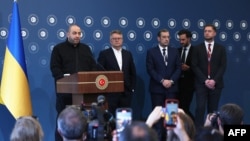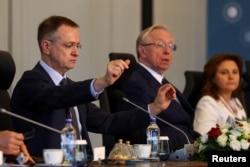Even before Ukrainian and Russian negotiators faced off across the conference room at Istanbul's famed Ciragan Palace on June 2, there was scant optimism for substantive progress toward peace.
After just about an hour of talks, it was clear even that was an overly rosy expectation.
And if that wasn't clear enough, Russia's pugilistic former president hammered home the point a day later.
"The Istanbul talks are not for striking a compromise peace on someone else's delusional terms but for ensuring our swift victory and the complete destruction of the neo-Nazi regime," Dmitry Medvedev, who is now a top official on the Russian Security Council, said in a post on Telegram.
The second round of negotiations to resolve Europe's largest land war since World War II ended with even less of an outcome than the first round.
Last month's initial talks were the first time Kyiv and Moscow had sat down face-to-face since the weeks just after Russia's all-out invasion in February 2022. Ukraine sent a high-level group of officials; Russia sent a delegation headed by Vladimir Medinsky, a blunt, former culture minister with a penchant for historical revisionism.
That they agreed to exchange up to 1,000 prisoners of war was seen as a success.
Proposals For Peace
In the run-up to the June 2 talks, the two sides were expected to exchange their specific proposals for a framework deal for peace.
Ukraine, which said it had transmitted its plan ahead of time to the Kremlin, called for, among other things, an unconditional, 30-day cease-fire, plus the exchange of all prisoners of war, as well as the return of Ukrainian children that Kyiv said have been abducted by Russia. As before, Ukraine sent Defense Minister Rustem Umerov.
Russia refused to share its plan ahead of time, which was seen as a bad sign. More ominous was that Medinsky was again the delegation's head.
"It would be wrong to expect any immediate breakthroughs at the negotiations between Russia and Ukraine in Istanbul," Kremlin spokesman Dmitry Peskov said on June 3.
When the Russian document was finally released, to the state news agency TASS, it confirmed observers' worst fears about Moscow's conditions for peace.
Among other things, the Russian proposal calls for the international recognition of Crimea, the Ukrainian peninsula Moscow annexed in 2014, as well as the four Ukrainian regions that are partially occupied by Russian forces.
The text even refers to the regions collectively as "Novorossiya" -- or "New Russia" -- which is a historical term used during the Russian Empire to describe lands that are now Ukrainian.
The Russian text calls for Ukraine to withdraw its troops from the territories claimed by Russia within 30 days of the cease-fire. It also calls for Ukraine to forego joining NATO and demobilize its armed forces, and a halving of foreign military aid to Kyiv.
"Talking about the meaning of this memorandum would only matter if we believed that the Russian delegation as a whole had some sincere intentions regarding these negotiations…that they also want to put an end to this war," said Kirill Martynov, editor in chief of the exiled Russian newspaper Novaya Gazeta Europa.
"But everything we see so far is…connected to the fact that the Russian side is confident it is winning the war -- that they just need to wait a little longer, press harder, finish it off, as Putin said, and Ukraine will fall," he told Current Time.
On the battlefield itself, Russia is ramping up its tempo of operations, with a full offensive expected soon. Russia maintains the upper hand, with more men and more weaponry at its disposal, and its forces are grinding forward in several locations. Ukrainian officials have warned the northeast region of Sumy could be a priority in any coming offensive.
Kyiv also made sure its approach was abundantly clear on the eve of the talks, when it pulled off an audacious surprise drone attack on multiple Russian airfields housing dozens of Russian strategic bombers that have been used to pummel Ukraine with cruise missiles.
But while Ukraine has been praised for ingenuity, particularly with drone warfare, it has struggled with recruiting and keeping its frontline trenches and foxholes fully manned against Russian infantry assaults -- not to mention Russia's own vast drone fleet.
The Wild Card White House
The other wild card is the White House. President Donald Trump has said he is impatient with the pace of negotiations and threatened to pull the United States out entirely from the effort.
But Trump and his advisers have also signaled frustration with Putin, who has been eager to rebuild relations with Washington after a decade of acrimony.
"It looks like the Russians are again stalling for time, trying to create a 'picture of diplomacy' for the United States without real action," Umerov wrote in a post on his Facebook page.
Trump's Senate Republican allies, with Democratic support, are pushing forward with legislation that would impose major new sanctions on Moscow.
That's an effort officials in Washington said is quietly being coordinated with the White House, though Republican Senator Lindsey Graham and Democratic Senator Richard Blumenthal were vocal about their stance during a tour of Europe -- which included a stop in Ukraine -- over the past week.
"What I learned on this trip was he's preparing for more war," Graham said of Putin said in an interview with the Associated Press.
Blumenthal called the sanctions proposed in the legislation "bone-crushing" and said they would place Russia's economy "on a trade island."
"It is crunch time for Putin and for the world because Russia is mounting a new offensive," he said.















